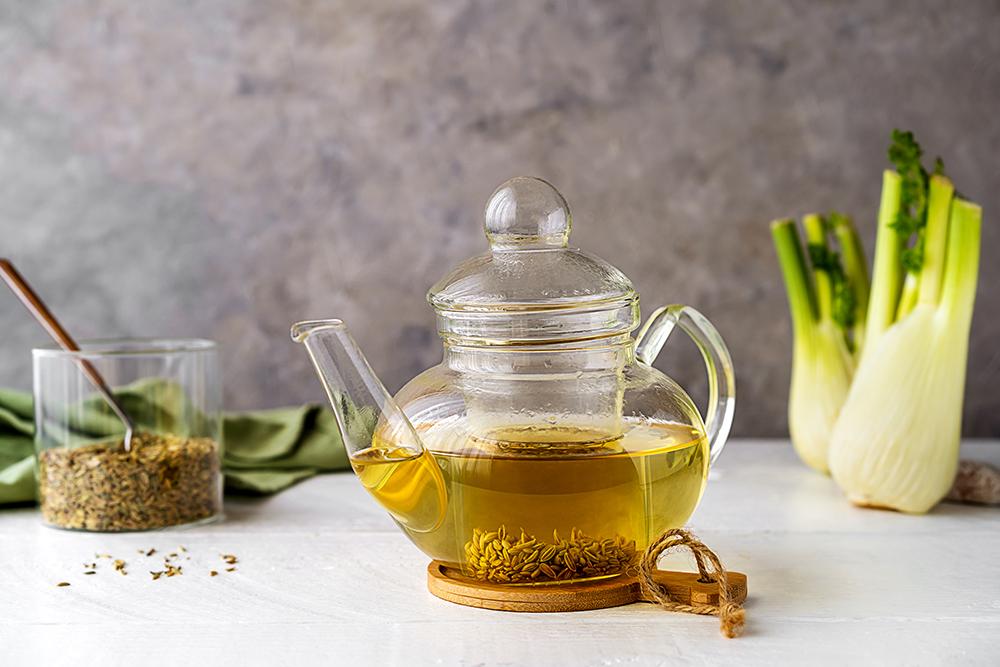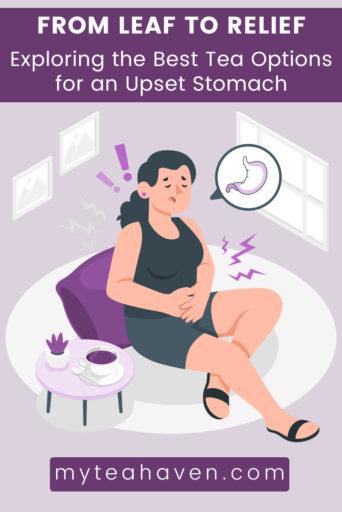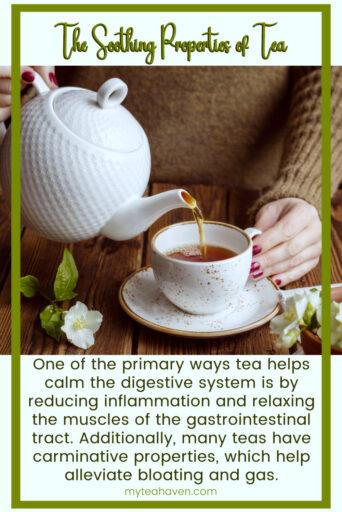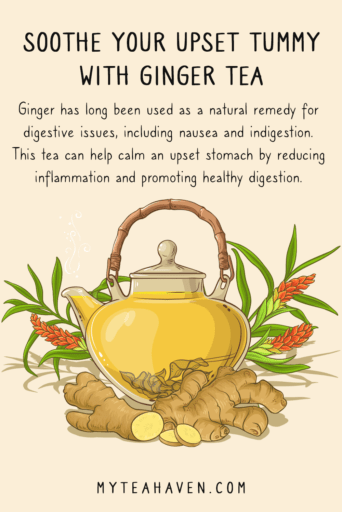From Leaf to Relief: Exploring the Best Tea Options for an Upset Stomach
Which Tea is Good for an Upset Stomach
I understand all too well the importance of finding the right natural remedy to ease an upset stomach. While there are numerous options available, the soothing qualities of tea make it a popular choice for alleviating an upset stomach. Today I will make my case why tea is a great natural remedy to soothe your tummy and getting you to feeling your best again as soon as possible!
We are a participant in the Amazon Services LLC Associates Program, an affiliate advertising program designed to provide a means for us to earn fees by linking to Amazon.com and related sites. This post may contain affiliate links which means we may receive a commission, at no cost to you, for purchases made using our links. Please see my disclosure to learn more. Unless otherwise stated, all prices are in US$.
What Exactly is an Upset Stomach?

An upset stomach, also known as indigestion or dyspepsia, refers to a range of digestive symptoms that can cause discomfort. These include bloating, nausea, abdominal pain, and a feeling of fullness.
Common causes of an upset stomach include overeating, consuming spicy or fatty foods, stress, and gastrointestinal disorders.
The Soothing Properties of Tea
Tea has been known for centuries as a comforting and therapeutic beverage. When it comes to an upset stomach, certain types of tea can provide relief due to their natural properties.
One of the primary ways tea helps calm the digestive system is by reducing inflammation and relaxing the muscles of the gastrointestinal tract. Additionally, many teas have carminative properties, which help alleviate bloating and gas.
Research also supports the benefits of tea for digestion. Compounds found in tea, such as polyphenols and catechins, possess anti-inflammatory and antioxidant properties. These compounds aid in the overall health of the digestive system and contribute to the soothing effects of tea on an upset stomach.
Best Teas for an Upset Stomach
Let’s take a look at which teas are most suitable when it comes to soothing an upset stomach.
Peppermint Tea
Peppermint tea is widely recognized for its ability to relieve digestive discomfort. The menthol in peppermint acts as a natural muscle relaxant, soothing the muscles of the gastrointestinal tract. It can help relieve abdominal pain, bloating, and indigestion.
To prepare peppermint tea, steep a teaspoon of dried peppermint leaves in a cup of hot water for 5 to 10 minutes. Sip the tea slowly and enjoy its refreshing flavor.

HANDPICK Peppermint Herbal Tea Bags
Experience the pure delight of Peppermint tea, a refreshing and caffeine-free beverage. Indulge in its pristine nature, free from any additives or caffeine, allowing you to savor its natural goodness to the fullest. Immerse yourself in the invigorating aroma and flavor of Peppermint, known for its distinct minty notes. Whether you enjoy it hot or chilled, Peppermint tea is the perfect choice for those seeking a pure and refreshing herbal infusion.
Ginger Tea
Ginger has long been used as a natural remedy for digestive issues, including nausea and indigestion. This tea can help calm an upset stomach by reducing inflammation and promoting healthy digestion.
To make ginger tea, steep a teaspoon of freshly grated ginger in hot water for 10 to 15 minutes. Strain the tea and add a squeeze of lemon or honey for added flavor.

HANDPICK Ginger Tea Bags
Embrace the pure and caffeine-free goodness of our Ginger Tea, meticulously crafted to offer you a premium tea experience. Delight in the invigorating warmth and essence that our Ginger Tea Bags provide, allowing you to immerse yourself in a moment of tranquility with each cup. Our Ginger Tea is carefully prepared without any preservatives or artificial add-ons, ensuring a truly natural and wholesome beverage.
Chamomile Tea
Chamomile tea is known for its calming and soothing properties, making it an excellent choice for an upset stomach caused by stress or anxiety. It can help relax the muscles of the gastrointestinal tract and reduce inflammation.
To prepare chamomile tea, steep a chamomile tea bag or a tablespoon of dried chamomile flowers in hot water for 5 to 10 minutes. Savor the gentle, floral taste as you allow the tea to ease your discomfort.

Teatulia Organic Chamomile Tea Bags
Delicate floral undertones enriched with hints of honeysuckle, sourced from organic cultivation in the fertile Egyptian soil. The package includes 50 pyramid tea bags, each thoughtfully packed with whole leaf tea, ensuring the same exceptional quality as loose leaf tea but with the convenience of a pre-measured bag.
Other Teas to Consider
While peppermint, ginger, and chamomile tea are often recommended for upset stomachs, there are other teas that may provide relief as well.
- Fennel tea: Fennel seeds have carminative properties that can help alleviate bloating and gas. Steep a teaspoon of crushed fennel seeds in hot water for 10 to 15 minutes and enjoy its mild licorice flavor.
- Licorice root tea: Licorice root tea can soothe the stomach lining and reduce inflammation. That being said, it’s important to note that excessive consumption of licorice root tea may have adverse effects, so it should always be consumed in moderation.
- Green tea: While green tea is not typically associated with upset stomach relief, it contains antioxidants that support overall digestive health. Choose a milder green tea variety and avoid adding any caffeine-rich ingredients.

HANDPICK Fennel Herbal Tea Bags
Savor the smooth and sweet flavor of our Fennel tea, a truly delightful herbal infusion that will captivate your palate. Indulge in the slightly sweet taste of our Fennel tea, where the gentle notes of fennel are complemented by hints of citrus and licorice-like flavors. The harmonious combination of these elements creates a unique and satisfying blend that will leave you craving another sip.
Precautions and Considerations
While tea can provide relief for an upset stomach, it’s essential to consider a few precautions. If you have a severe upset stomach or persistent digestive issues, it’s advisable to consult with a healthcare professional for a proper diagnosis and personalized guidance. Additionally, individuals with specific allergies or sensitivities should be cautious when selecting teas to avoid any adverse reactions.
A Few Final Thoughts

Tea offers a natural and soothing solution for easing an upset stomach. The diverse range of teas available allows you to choose the one that suits your preferences and provides the most relief.
Peppermint, ginger, and chamomile teas are among the top recommendations due to their proven benefits for digestion. However, other teas like fennel and licorice root can also be helpful.
Remember to listen to your body and consult with a healthcare professional when necessary. Enjoy the comforting properties of tea and bid farewell to your upset stomach!
Some Questions You Might Have
- Can I drink tea if I have a severe upset stomach?
While tea can help with mild upset stomachs, severe cases may require medical attention. It’s best to consult with a healthcare professional for appropriate advice.
- Are there any teas I should avoid when experiencing an upset stomach?
Certain herbal teas may aggravate heartburn in some people. It’s advisable to monitor your body’s reaction and avoid any teas that worsen your symptoms.
- Can I add sweeteners or milk to my tea for an upset stomach?
It’s recommended to consume tea without any sweeteners or milk when targeting an upset stomach. These additions may introduce unnecessary elements that could potentially irritate your digestive system.
- How long should I steep the tea for maximum benefits?
The ideal steeping time varies depending on the type of tea. Steeping for 5 to 15 minutes usually ensures optimal extraction of the tea’s beneficial compounds.
- Can I drink multiple types of tea in a day to help with an upset stomach?
It is possible to try different teas throughout the day, but it’s crucial to observe how your body responds. Some people may find relief with a particular tea, while others may need to stick to one type for better results. Pay attention to your body’s signals and adjust accordingly.
Please keep in mind that the information presented here is not meant to serve as medical advice. This article is only meant to provide general information. Always consult your doctor before making any health-related decisions.







